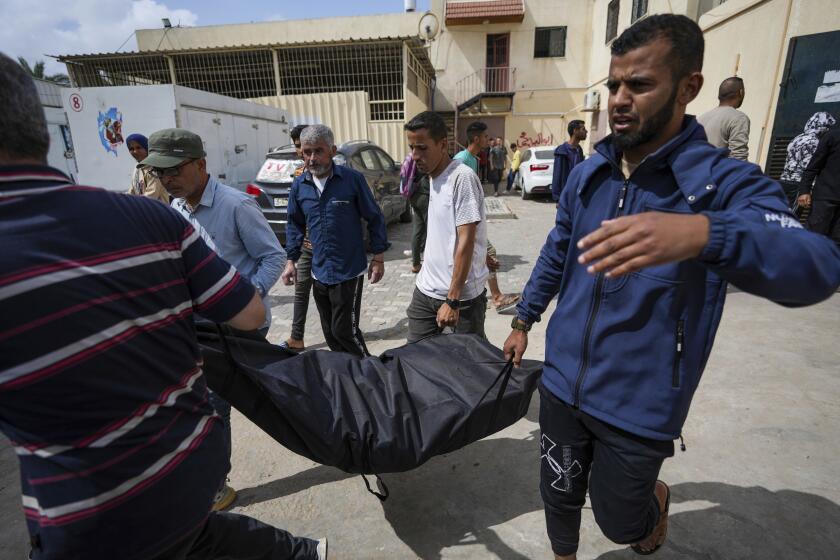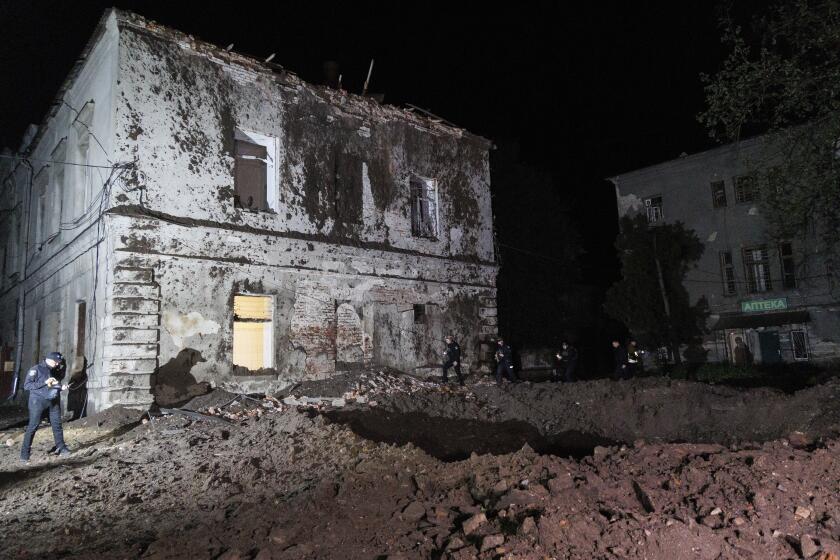Bhutto blazed trail few can follow
Squeezed into segregated public buses with scant seats reserved for women, schoolteacher Suneela Mohsin thinks of Benazir Bhutto. She thinks of the slain leader when she walks crowded streets, forbidden to talk to strange men in public or even make eye contact in this society dominated by men.
“Our culture offers women very little public space,” she said, wearing a deep maroon dupatta, the traditional shawl-like covering, around her head and body. “Benazir was our last hope of change. But now she’s gone.”
For women such as Mohsin, Pakistan is a land of bitter contradictions. Entrenched tribal and religious taboos subject women to what human rights groups call some of the cruelest repression in the world. But the country also elected Bhutto, the first female prime minister of a Muslim nation.
Bhutto’s assassination last month has led many here to reassess her contribution to women’s rights in her homeland: Was she merely an iconic figurehead, or did she bring real change through her actions and public policies?
Lawyer Asma Jahangir, Pakistan’s leading human rights advocate, said Bhutto did more for women than any other Pakistani leader, including appointing female judges and establishing a commission for women’s rights.
“She opened the dialogue of women’s rights in Pakistan,” Jahangir said. “She did more than talk, she walked the walk. We just expected her to walk more.”
In Pakistan, seven of 10 women can’t read, one of the highest illiteracy rates in South Asia. So-called honor killings, gang rape and sexual attacks are frequent, but those who report assaults are more likely to go to prison than see justice.
Critics say Bhutto was a flawed leader whose two terms as prime minister were ineffectual. She wasted an opportunity, they say, to repeal draconian ordinances enacted in 1979 by President Zia ul-Haq, the man who ousted her father from power and then had him executed. The ordinances, part of his radical efforts toward “Islamization,” mandated harsh punishments, including death, for extramarital sex.
“She didn’t make any breakthroughs to counter brutish behavior; her changes were cosmetic,” said Farzana Bari, director of the Center of Excellence in Gender Studies at Quaid-i-Azam University in Islamabad, the capital.
“We had such high hopes for her as a woman representing a liberal party in Pakistan, that she could bring about real change for women here. Of course, she didn’t do it.”
Bhutto’s supporters say she brought progress for women in other ways, including the creation of the first bank run by women, healthcare programs and female-staffed police stations.
“Her record on women’s rights may not seem great, but she was leader of all people, and felt she couldn’t afford to exclusively promote women and alienate men,” said Saba Gul Khattak, a fellow at Pakistan’s Sustainable Development Policy Institute. “She had to tread a path somewhere in between. That’s the reality of politics.”
Bhutto held her ground on women’s rights while under attack from tribal warlords and conservative mullahs.
“Women didn’t take a step backward under Benazir. She didn’t allow any new negative polices to be enacted,” said Neelam Hussain, a member of the Women’s Action Forum, an Islamabad-based political action group.
But in Pakistan, where women account for 49% of the 160-million population, many are entering workplaces that offer them little equality and few opportunities for advancement. In many companies, women are paid less and handed support jobs.
In many schools, for example, women are not allowed to teach male students once they reach a certain age. The thinking: Boys need the firm hand of a man for guidance and discipline.
Barriers for women aren’t just in the workplace. They hit home as well.
“I may have more rights than my mother did, but I still can’t go out alone after 8 p.m., I can’t have boyfriends, and I won’t marry for love -- my wedding will be arranged,” Mariam Hubib lamented as she walked across the campus of the elite Kinnaird College here.
Hubib, 20, is a linguistics major who has hopes of entering the job market when she graduates. But there’s one problem: Her parents won’t let her.
“It’s still not considered good for women to work,” she said with a sigh. “My family is conservative. I don’t know what I’ll do with my education. I guess just wait around for my husband to arrive.”
She aches to become an independent woman like Benazir Bhutto. “She spoke out even though she knew she was in danger. How can I even think of becoming like her? My father won’t let me.”
Other women say Bhutto’s presence alone challenged traditional male attitudes.
“There were those who said it was un-Islamic to have a woman leader, that any country with a woman leader was going to hell,” said Saadia Toor, a sociologist at the College of Staten Island who specializes in Pakistan. “It was incredibly difficult to lead a nation when this is the level of things that were thrown at you.”
The populist Bhutto appealed to both women and men. Tahseen Alfarooq, a Pakistani businessman who has lived in Germany, said Bhutto’s Achilles’ heel was, ironically, a man. Her husband, Pakistani politician Asif Ali Zardari, was widely disliked and has been called “Mr. 10%” for his alleged penchant for taking kickbacks on government deals.
“He was a corrupt man,” Alfarooq said, “who sullied the reputation of an honest woman.”
Bhutto wasn’t the first female politician to be killed in Pakistan. Last year, Zill-e-Huma Usman, the social welfare minister in Punjab, the nation’s largest province, was gunned down by a man who walked up to her and asked, “Why aren’t you wearing proper Islamic dress?”
The assailant then calmly surrendered to police, insisting that women seen outside the home are evil. “I have killed her out of conviction that she was leading an un-Islamic life and spreading an evil influence on other women,” he said.
Activists worry that women in Pakistan are in more peril than ever. Even after the 2002 assault case of a rural woman who had been publicly gang-raped under the order of a village court made international news, such crimes continue.
“There is a degree of violence accepted here that should be unacceptable in any society,” said lawyer Hina Jilani, a civil rights activist. “Women’s lives and liberties are not considered sacred. And that will certainly not get any better now that Bhutto is gone.”
In late 2006, amid widespread opposition from religious extremists, President Pervez Musharraf signed into law the Protection of Women Act, making it slightly easier to prosecute sexual assault cases and reducing the penalty for extramarital sex. Under the previous law, women who alleged rape often found themselves convicted of adultery.
For her part, Suneela Mohsin wasn’t always a fan of Bhutto, who had all the entitlements of class, wealth and privilege. But eventually she began to pattern her own life after Bhutto’s. After all, what other role models were out there? She pressured her husband, a call center worker, to get them out from his parents’ into their own home.
Mohsin wanted independence. After five years of marriage and two children, she wasn’t satisfied. She wanted to go to work, and she was lucky -- her husband supported her.
Now she works half days as an elementary schoolteacher. The arrangement allows her to get home before dark, when she says unaccompanied women in public can encounter problems.
On the evening Bhutto was assassinated, Mohsin was shopping in a neighborhood market when a boy rushed into the store and breathlessly announced that the former prime minister was dead.
“Don’t you believe him,” she told the shopkeeper. “She is too smart for that. They couldn’t kill her. Not Benazir.”
But then she saw the people crowded before television sets. “I cried all the way home,” she said. “I realized that maybe I loved her after all, for what she meant to my life.”
There is menace on the streets, she says, so much more now that her Benazir is dead.
“She emboldened all of us,” she said.
“She was a strong woman. But if Benazir Bhutto is not safe, what can the rest of us expect?”
--
More to Read
Start your day right
Sign up for Essential California for news, features and recommendations from the L.A. Times and beyond in your inbox six days a week.
You may occasionally receive promotional content from the Los Angeles Times.







